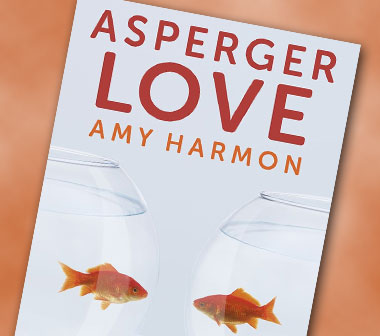In her Kindle book Asperger Love: Searching for Romance When You’re Not Wired to Connect, Amy Harmon writes with warmth and empathy as she follows Jack Robison and Kirsten Lindsmith through their day-to-day lives. Both of them have Asperger’s disorder and although they love one another, they struggle daily with the role that their inability to read social cues plays in their desire to find closeness and intimacy in a relationship.
For those of us who have worked with Asperger’s patients, this book is an opportunity to be a fly on the wall, and to feel their struggles instead of just knowing them in a clinical way. Jack and Kirsten are logical and bright and can understand where their problems originate. The pathos of this book comes from the way that they work through those problems to find meaning in their relationship as well as how they surmount the problems that the world presents.
Jack is studying chemistry and is the son of an Asperger’s father who credits his Asperger’s -related obsessive attention to detail to his success in business. Kirsten is a college freshman, a girl who was dating a non-Asperger’s boyfriend who always told her how she needed to change her behavior. She is relieved to be with someone who not only understands her, but also does not try to change her, accepting her as she is. Both Jack and Kristen understand one another’s obsessive interests and take pleasure in asking detailed questions about these respective interests.
In many touching scenes, the couple tries to navigate physical intimacy and cope with the challenges that their various physical sensitivities present. Jack feels that kissing is much like having someone squish your face. He also does not like to have his back rubbed and is uncomfortable with public displays of affection.
Kirsten struggles with what she perceives as Jack’s criticisms, which he feels is a simple stating of the facts. She often wants to be held or soothed, and Jack is unable to recognize her need for that kind of attention and love. He often doesn’t recognize her need to have someone, or something to cuddle.
This book disputes the often-held opinion that individuals with Asperger’s cannot have friendships and intimate relationships because of their inability to read social cues, sometimes called “face blindness” or “mind blindness.” It also helps us to understand the anxieties and fears that many Asperger’s individuals have because they find it difficult to distinguish friendly behavior from friendships. They carry these worries into their young adult lives when they wish to have romantic relationships. Indeed, they are not indifferent to relationships, but they just have more challenges to achieve them.
Amy Harmon is a multiple Pulitzer-prize-winning writer who followed Jack and Kirsten’s lives carefully, but caringly with great humanism and empathy. This book is an intimate look at what everyone longs for – to be loved. It is a book that should be read not only by psychologists and families of Asperger’s individuals, but also by teachers, pediatricians and the world at large. You can listen to a recent radio segment with Amy Harmon and the subjects of her book, Jack Robison and Kirsten Lindsmith, on NPR’s On Point Radio.

